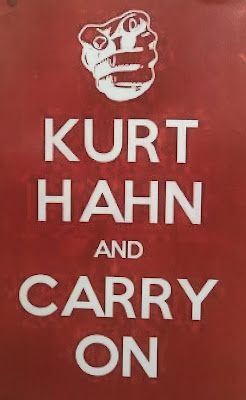Do we have 2020 Vision?
Do we have
2020 vision?
Moving into this
new decade encourages us to take a long term perspective. We have been around 13.7 billion years and
expressed in 24 hour chronological time, we humans only show up at 22:30 and
the whole of recorded history happens in the last 10 seconds before the chimes
of Big Ben at midnight!
No wonder
then that we may be reeling with the pace of change; or is it just
me? Thomas
Friedman thinks
not: he implies technological change is outpacing our ability to adapt to
it. The technological supernova is charging ahead and we lack the
cognitive (let alone the social or emotional) capacity to keep up. If the pace of technological change
(expressed in terms of the development of Intel processors since 1971) were
applied to a VW Beetle, it would be hurtling around at 300,000 miles per hour
and we’d be getting 2 million miles per gallon of petrol. It would
cost US 4 cents.
So what are
the lessons here for us educators? How
do we accelerate students’ ability to adapt? At UWC Atlantic, we are on a
quest to develop a methodology for Changemaker Education that resonates with
our mission: to make education a
force to unite people, nations and cultures for peace and a sustainable future.
So here are 3 curriculum
predictions and resolutions for 2020 that will help us start this decade on the
right course:
1) This
decade will see a shift from assessment by performance to assessment by
portfolio.
Linear,
assessment heavy, curriculum models drain the wellbeing of young people and
make learning the servant of validity, reliability and accountability. We need a new valuing system for educational
success; one that captures all that has been learned. Success comes from understanding oneself as an
agent of change; finding purpose and being given the chance to share this with
the world. Exploring new forms of evaluation
doesn’t mean being shallow about learning; it means capturing and celebrating
what has actually been learned and empowering students to own this process.
This chimes
with how the professional world is shifting.
Google, Apple and Ernst and Young are among firms no longer requiring
undergraduate degrees. They are valuing applicants’ future capacity to learn, evidence
of projects they have led or managed, and the impact they have had. Young people need a portfolio that showcases
their passion, the depth of their learning, their readiness to progress to
further study, their professional skills, their talent and impact. In
2020, at UWC Atlantic we will explore new forms of assessment and evaluation.
We will encourage universities to ‘insource’ their admission processes through Mastery Transcript Consortium leaving
students free to learn what is most useful to them and the world.
2) This
decade will see a continued shift from single subject curriculum delivery to issue
based, real world, learning.
Young
people want (and need) to understand how the world works and is changing
and what the drivers and consequences of this change are so they can make
intelligent and responsible decisions.
Single subject learning prepares students well for more single subject
learning but not to live in a world beset with ‘wicked problems’ such as climate
change, conflict, structural inequality, migration, health and wellbeing - each
of which draw on a myriad of disciplines. The era of the specialist is giving
way to the era of the technical generalist who can make connections between
diverse fields that singular specialists cannot. David Epstein in Range argues that
this makes generalists more creative, innovative and, ultimately, more impactful. In 2020, at UWC Atlantic, we will find
ways of allowing students to learn about the world in its complexity to help
them find their passion and develop the skills they need to make an impact in
the world.
3) This
decade will see a disruption towards a more agile approach to curriculum
development and learning
In the old
model we forged a career from the knowledge we acquired during our undergraduate
degree. Not anymore; we need to keep learning
to progress. Businesses now create mobile micro-learning opportunities
that help employees keep pace with sector and organisational
change. This is how learning happens: people are
accessing ‘just in time’ knowledge when it suits them rather than learning
‘just in case’ knowledge as a group. In
schools and colleges, we are wedded to a 5-year curriculum review cycle (at
best) and teaching courses that are sometimes out of date before they have even
been taught. The curriculum development
process needs disrupting so that teachers can reclaim the essence of their
craft. In 2020, at UWC Atlantic, we will empower teachers to develop curricula
so that students are learning from an emerging future rather than reaching into
the future to find it continually beyond their grasp.
These aspirations will evolve as we start our Big Changemaker
Education Conversation in the early part of this year. Please be part of this by sharing your comments and your own curriculum
innovations here and on Mighty Network. Happy New Year and remember,
we journey alone but we voyage together!

Comments
Post a Comment